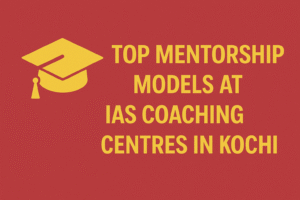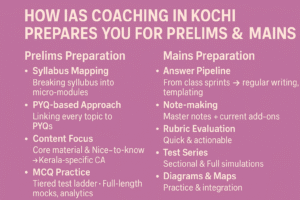What “mentorship” should deliver
Clarity: a realistic plan to finish syllabus + revision loops
Feedback: specific, actionable comments on answers and tests
Accountability: weekly check-ins; score and habit tracking
Personalisation: pacing, weak-topic fixes, and exam temperament
Quick View: Mentorship Models & Best Fit
| Model | How it works | Best for | Watch-outs |
|---|---|---|---|
| 1:1 Personal Mentor | Fixed mentor meets you weekly/fortnightly; plans, reviews tests/answers | First-timers, repeaters needing tight control | Mentor load (ask for guaranteed minutes + SLA) |
| Cohort Mentor (10–20 learners) | Small group with the same mentor; shared goals, peer reviews | Students who learn from peers | Keep groups small; ensure private feedback too |
| Answer Writing Lab (Evaluator-led) | Dedicated evaluator marks copies with rubrics; daily or alternate-day sprints | Mains-focused, repeaters | Need ≤5-day turnaround + sample marked copies |
| Data-Driven Coach | Uses test analytics dashboards to prescribe topic-wise drills | Analytical learners | Requires reliable test platform + honest data |
| Office-Hours Mentoring | Drop-in slots each week for doubts & strategy | Hybrid/working professionals | Can get crowded; pre-booking needed |
| Optional Pod Mentor | Optional subject-specific pod + PYQ mapping | Optional-heavy plans | Check the mentor’s past selections + notes quality |
| Peer Study Circle (facilitated) | Institute hosts 5–8 learner circles; mentor audits fortnightly | Budget conscious; self-driven | Needs structure (agendas, minutes, penalties) |
| Interview/DAF Mentor Panel | Multi-panel mocks, DAF clinics, Kerala-governance case prep | Post-mains stage | Recordings + written debriefs are essential |
| Bridge Plan for Working Pros | Weekly mentor call + quarterly bootcamps; recording-first pedagogy | Full-time job holders | Ensure test cadence isn’t compromised |
What good mentoring looks like (standards you can demand)
SLA for feedback:
Prelims test analysis: 24–48 hrs
Mains answer copies: ≤ 5 days
Doubts: same-day in chat; complex within 48 hrs
Documented plan:
12–16 week study plan; topic ladder; revision cycles; mock calendar
Shared artefacts:
Mentoring notes, rubric sheets, weak-topic logs, “top-50 mistakes” list
Measurable progress:
Attempt rate vs accuracy, answer structure scores, CSAT pacing charts
Escalation path:
If mentor unavailable → backup mentor within 48 hrs
Inside the Models (Kochi implementations)
1) 1:1 Personal Mentor
Cadence: 30–45 mins/fortnight; quick check-ins on Telegram/Slack.
Deliverables: micro-plan, scoresheet, answer diagnostics, motivation audit.
Pros: tight accountability, custom pacing.
Cons: costlier; quality varies by mentor bandwidth.
2) Cohort Mentoring (micro-batches)
Cadence: weekly huddles (45–60 mins); shared scoreboard.
Tools: peer review exchanges, lightning answer drills.
Pros: peer pressure, idea cross-pollination.
Cons: shy learners may speak less—ask for rotation speaking rules.
3) Answer Writing Lab
Cadence: daily/alternate-day 10–12 min answers; weekend 250-word clinics.
Rubric: relevance, structure, examples, diagrams, way-forward.
Pros: fastest improvement for mains.
Cons: needs disciplined submission; insist on before/after samples.
4) Data-Driven Coaching
Cadence: post-test 1:1 (15–20 mins); topic heatmaps and “stop-loss” rules.
Pros: objective; reduces guesswork for Prelims.
Cons: only as good as test quality; avoid centres that hide item stats.
5) Office-Hours Model
Cadence: 6–8 hrs/week open desk with senior faculty.
Pros: instant doubt clearing for hybrid/online learners.
Cons: queueing—look for booking slots.
6) Optional Subject Pods
Cadence: weekly paper-wise clinic; PYQ re-mapping every 4 weeks.
Pros: depth + focused notes; ideal for Pub Ad/Geog/Socio etc.
Cons: verify recent topper copies & updated case-lists.
7) Peer Study Circles
Cadence: 3 meets/week, 90 minutes each; agendas pre-set by mentor.
Pros: nearly free add-on; strong discipline if structured.
Cons: can drift—use meeting minutes & penalties for no-shows.
8) Interview/DAF Panel Mentoring
Cadence: 2–3 full panel mocks; micro-mocks on current issues.
Pros: fixes tone, structure, Kerala governance depth.
Cons: demand written debrief + recording.
9) Bridge Plan (Working Professionals)
Cadence: weekly mentor call + test every Sunday; quarterly offline bootcamp.
Pros: realistic for 15–18 hrs/week schedules.
Cons: protect non-negotiables: weekly test + review.
Indicative Costs (add-on to tuition)
1:1 mentor track: ₹10,000–₹35,000 per 3–6 months
Answer writing lab: ₹8,000–₹25,000 (duration-dependent)
Interview panel pack: ₹5,000–₹15,000
Data/analytics add-on: often included in test series; ask explicitly
Always ask for written deliverables, number of sessions, SLA, and refund/deferral rules.
12-Week Sample Mentorship Plan
Weeks 1–2: Baseline test (Prelims + Mains), weak-topic map, study timetable.
Weeks 3–4: Sectional tests; start daily 10-min answers; CSAT pacing drills.
Weeks 5–6: First cumulative mock; rubric clinic; revise top-50 errors.
Weeks 7–8: Raise attempt rate; essay outline weekend; optional pod meeting.
Weeks 9–10: Full-length mock; analytics session; stop-loss and guess rules.
Weeks 11–12: Mains copy clinic (before/after), interview mini-mock, final plan.
What to ask before enrolling
How many guaranteed mentor minutes per month? With who?
Feedback SLA for answer copies and tests?
Will I receive sample evaluated copies & rubric sheet today?
How are scores tracked (dashboard/screenshots)?
If my mentor is busy, what is the escalation path?
Are mentor sessions recorded/summarised and shared?
Is there a working-professional track (recordings + weekly test)?
Put the deliverables in writing with refund/deferral rules.
FAQs
Q1. Which mentorship model is best for a first-time aspirant?
A: A hybrid of 1:1 mentor + cohort works well: private accountability plus peer momentum.
Q2. I’m a repeater targeting Mains—what should I choose?
A: Answer Writing Lab with evaluator rubrics + data-driven coaching from your test series.
Q3. How often should I meet my mentor?
A: Minimum fortnightly 30–45 mins; weekly during mocks or final 10–12 weeks.
Q4. What turnaround time is acceptable for checked copies?
A: ≤ 5 days with specific margin comments (examples, diagrams, structure).
Q5. Can mentorship be fully online?
A: Yes—ensure recorded sessions, shared notes, and dashboard access. Combine with periodic offline bootcamps when possible.
Q6. Are peer study circles useful?
A: Very—if facilitated with agendas, time-keepers, and mentor audits. Otherwise they drift.
Q7. How do I verify mentor quality?
A: Ask for two anonymised evaluated copies, a rubric sheet, and recent mentee outcomes.
Q8. What budget should I keep aside beyond tuition?
A: ₹10k–₹35k for a 1:1 track or ₹8k–₹25k for an answer-lab cycle; interview packs ₹5k–₹15k.







